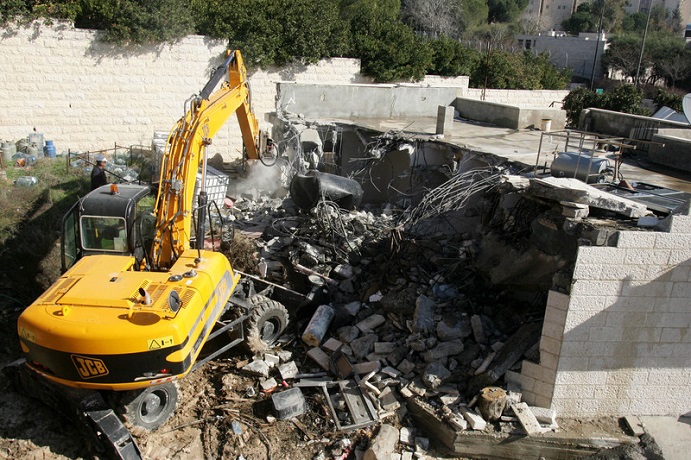
Ali Abunimah
The Electronic Intifada / February 12, 2020
The United Nations on Wednesday finally released its database of companies involved in Israel’s settlements in the occupied West Bank, including East Jerusalem, and Syria’s Golan Heights.
The release of the database comes after years of unexplained delays, which prompted human rights organizations to express concern that the UN was succumbing to political pressure to suppress the information.
Israel’s colonial settlements on occupied land are illegal under international law and the International Criminal Court prosecutor has decided to investigate their construction as a war crime.
The report released by the UN Office of the High Commissioner for Human Rights lists 112 companies involved in certain activities in the settlements, including the supply of equipment and materials for construction or home demolitions, surveillance and security, transport and maintenance, pollution and dumping of waste, and use of natural resources including water and land.
The Boycott Divestment and Sanctions National Committee, the steering group for the Palestinian-led BDS campaign, welcomed the release of the database, which came “despite bullying by [President Donald] Trump and Israel’s far-right government.”
It added that “these companies must be held to account, including through strategic boycotts and divestment campaigns.”
Israel reacted to the publication of the list with rage.
Gilad Erdan, the country’s minister of strategic affairs, claimed that it “proves once again the UN’s consistent anti-Semitism and Israel-hatred.”
Unable to defend its violations of international law, Israel now routinely smears even the mildest critics as anti-Semites.
Well-known brands
The database includes Israeli firms and well-known international brands such as travel companies Airbnb, Booking.com and TripAdvisor, construction equipment maker JCB, real estate company Re/Max, train maker Alstom, US food giant General Mills and electronics firm Motorola.
General Mills owns dozens of familiar supermarket brands including Häagen-Dazs, Yoplait and Cheerios.
Also on the list is Mayer’s Cars and Trucks, the Israeli agent for Sweden-based equipment maker Volvo. But Volvo itself is not listed.
Volvo provides equipment for destroying Palestinian property, trucks to transport waste to illegal dumps and armoured buses for settlements.
Also notably absent from the list is Caterpillar, long a target of campaigners for selling construction equipment used by Israel to build settlements and destroy Palestinian homes.
Its Israeli agent, Israel Tractors and Equipment, also does not appear on the list despite Caterpillar’s documented role in settlement expansion and providing the Israeli army with bulldozers that are used as weapons.
The BDS National Committee pointed to other major omissions: G4S, Hewlett-Packard companies, Hyundai Heavy Industries, HeidelbergCement, Cemex and Israeli arms maker Elbit Systems.
Israeli firms that are on the UN list include major banks, which finance the theft of Palestinian land, and Israel’s national water company Mekorot, which pillages Palestinian water.
Israeli supermarket chain Shufersal, which runs stores and supply chains in settlements, is also on the list.
That is notable because several European Union embassies have run joint promotions of their countries’ products with the firm, despite Shufersal being a settlement profiteer. The EU claims to oppose Israeli settlements.
Israeli pressure
The UN database was originally supposed to be released three years ago.
Israel and the US have been determined to stop its publication, fearing it could provide a major boost to efforts to hold Israel accountable and force companies to stop helping Israel violate Palestinian rights.
Israel planned “to do everything it can to ensure that this list does not see the light of day,” Danny Danon, the country’s ambassador to the UN, said in 2017.
The database is clearly not comprehensive and is limited only to businesses involved in activities specified by the UN Human Rights Council mandate.
As its authors acknowledge, the “database does not cover all business activity related to settlements, and does not extend to wider business activity in the occupied Palestinian territory that may raise human rights concerns.”
An example of the types of activities the database does not cover is investing in firms involved in Israeli crimes.
France-based insurer Axa, for example, is under pressure from activists to divest from Israeli weapons makers and banks that finance settlements.
Axa is not included in the UN database.
Nevertheless, campaigners see the publication of the database as an important first step and a tool to push for accountability.
Human Rights Watch, one of the organizations that had criticized the UN for repeatedly delaying publication, welcomed the release of the database.
“The long-awaited release of the UN settlement business database should put all companies on notice: To do business with illegal settlements is to aid in the commission of war crimes,” Bruno Stagno, the group’s executive director for advocacy, said.
“The database marks critical progress in the global effort to ensure businesses end complicity in rights abuse and respect international law.”
The UN is expected to update the list annually.
Ali Abuniamh is a co-founder of The Electronic Intifada and author of The Battle for Justice in Palestine, now out from Haymarket Books












